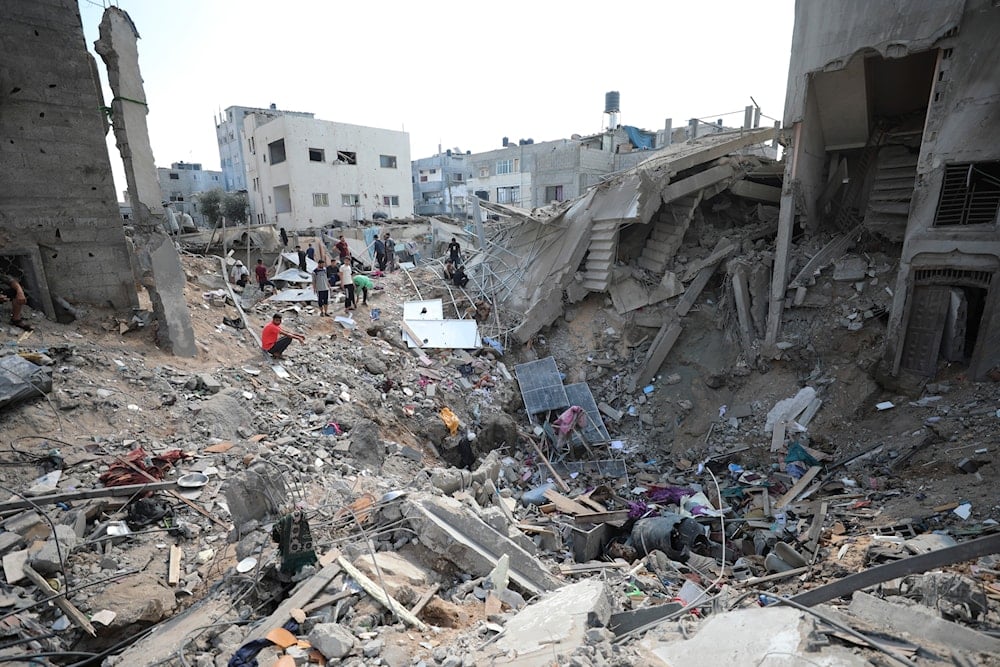Gaza's displaced surrounded by incessant Israeli bombings
An eight-year-old told AFP that her family had been bombed repeatedly in every place they attempted to seek refuge.
-

Palestinians look at destruction after an Israeli strike on the Gaza Strip in Nusseirat refugee camp, central Gaza Strip, Friday, Nov. 17, 2023 (AP Photo/Marwan Saleh)
Airstrikes, devastated homes, and loved ones killed by bombs: Palestinians fleeing the northern Gaza Strip after "Israel" threatened them have found no safe place to hide.
An eight-year-old girl, Nada Abu Hiya, told AFP that she witnessed three distinct blasts in every location where her family sought to flee from Israeli strikes.
The most recent was in the Nuseirat refugee camp.
"First they bombed my grandfather's house where we lived" in Gaza City, she explained, adding that they were "bombed again" when they escaped to Deir el-Balah.
"So we came here and they bombed us again," she expressed.
Israeli airstrikes killed 18 people in Nuseirat on Friday morning. This was preceded by several bombardments of residential homes and buildings in Khan Yunis, Nuseirat refugee camp, and al-Jalaa roundabout in the northern Gaza strip last week.
Nada expressed to AFP "My grandmother is dead, my mother is dead, my grandfather is dead, my uncle is dead, they destroyed our house. Our neighbours' house is also destroyed and they are all dead."
The toddler is one of hundreds of thousands of Palestinians who have left Gaza City and other parts of the north in recent weeks as Israeli forces continue to bombard Gazans under the guise of eradicating Hamas.
According to the UN, more than 1.5 million people have been displaced in Gaza, accounting for over two-thirds of the territory's population and over 3,750 people including 1,800 children.
The Chief of Staff of the Israel Occupation Forces (IOF), Herzi Halevi, announced on Friday that "Israel" is prepared to extend its military campaign beyond northern Gaza.
He said that the IOF is planning to expand its activities in the Gaza Strip with the intention of targeting more areas "and going to kill [resistance] commanders and operatives and destroy the infrastructure."
3 children killed among Nuseirat victims
Azhar al-Rifi, 36, first escaped to the north to reside with family in Deir el-Balah, only to have their home destroyed. She then sought safety at the Nuseirat camp.
Three of the children killed in the bombing were relatives of hers.
She lost her 5-year-old nephew Joud to the Israeli strikes, recalling that his mother only died two weeks ago.
The boy had sadly told her he acknowledged that his mother's martyrdom meant he could no longer refer to anyone as his mother.
Rifi responded to him that she would be his mother instead.
"Safe" zones
When the war began, "Israel" had threatened almost 1,2 million residents in the north of the Strip to move south.
The IOF also proposed the creation of an alleged "safe zone" in southern Gaza known as Muwasi, encompassing a few square kilometers (approximately 1 square mile). This area is intended to remain free from airstrikes and potentially serve as a hub for the delivery of humanitarian aid.
However, a group of UN agencies has rejected the idea of safe zones set up without the agreement of all parties, warning that such zones could increase humanitarian risks for civilians.
"Under the prevalent conditions, proposals to unilaterally create a safe zone in Gaza risk creating harm for civilians and large-scale loss of life and must be rejected," the heads of some 20 UN and other humanitarian agencies said in a joint statement.
"Concentrating civilians in such zones in the context of active hostilities can raise the risk of attack and additional harm. No safe zone is truly safe when it is declared unilaterally or enforced by the presence of armed forces."
Israeli ethnic cleansing
Since the start of the war on Gaza, over 1.5 million out of Gaza's 2.3 million people have been forcibly displaced from their homes.
The UN reports that 813,000 of them are staying in overcrowded shelters, leading to the spread of diseases such as acute respiratory illnesses and diarrhea.
There are concerns that Israel and the US are pushing for the creation of a safe zone as a humanitarian solution, given the overcrowded conditions in UN schools serving as shelters for displaced Palestinians.
A UN official expressed skepticism about the Israeli intentions of letting displaced individuals return to the north, raising concerns about a potential repeat of the Nakba, an Arabic term for "catastrophe," referring to the mass displacement of Palestinians during the 1948 war that followed the creation of Israel.
"In discussions with the US we have warned against a Nakba 2," said the UN official. "We do not believe the Israelis will allow those displaced from the north to go back," he added, noting that "Now they say they are looking for Hamas leaders in the south so they want to push people out."

 5 Min Read
5 Min Read








